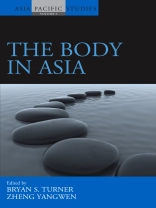The past few decades have seen growing interest in the study of the body. However, the increasing number of exciting and influential publications has primarily, if not exclusively, focused on the body in Western cultures. The various works produced by Asian scholars remain largely unknown to Western academic debates even though Asia is home to a host of rich body cultures and religions. The peoples of Asia have experienced colonization, decolonization, and now globalization, all of which make the ‘body in Asia’ a rewarding field of research. This unique volume brings together a number of scholars who work on East, Southeast and South Asia and presents original and cutting edge research on the body in various Asian cultures.
Table of Content
List of Figures
Acknowledgements
Introduction: Piety, Politics and Philosophy: Asia and the Global Body
Bryan S. Turner and Zheng Yangwen
Chapter 1. The Global Body Cannot Ignore Asia
Susan Brownell
PART I: THE BODY AND RELIGION
Chapter 2. Saint or Serpent? Engendering the Female Body in Medieval Japanese Buddhist Narratives
Monika Dix
Chapter 3. Creating Religious Bodies: Fasting Rituals in West Java
Jörgen Hellman
Chapter 4. Formations of Public Piety: New Veiling, the Body, and the Citizen-Subject in Contemporary Indonesia
Sonja van Wichelen
PART II: THE BODY AND CULTURE
Chapter 5. Westernized Body or Japanized Western Body: The Desirable Female Body in Contemporary Japanese Women’s Magazines
Junko Ishiguro
Chapter 6. Fatness and Well-being: Bodies and the Generation Gap in Contemporary China
Anna Lora-Wainwright
PART III: THE BODY AND THE STATE
Chapter 7. Seki Jūrōji and the Japanese Body: Martial Arts, Kokutai, and Citizen–State Relations in Meiji Japan
Denis Gainty
Chapter 8. The Sacred and the Sanitary: The Colonial ‘Medicalization’ of the Filipino Body
Julius Bautista with Ma. Mercedes Planta
Chapter 9. State and Religion Contestations over the Body: Hook Swinging and the Production of New Human Subjects
R. Santhosh
Chapter 10. Women’s Revolution and Liberation Embodied in Mao Zedong Era Ballet
Zheng Yangwen
Notes on Contributors
Bibliography
Index
About the author
Bryan S. Turner is the Alona Evans Distinguished Visiting Professor of Sociology, Wellesley College, USA (2009–2011) and Professor of Social and Political Thought and Director of the Centre for the Study of Contemporary Muslim Societies at the University of Western Sydney, Australia. He has published Weber and Islam (1974), Marx and the End of Orientalism (1978), and edited Religious Diversity and Civil Society (2007). With Mike Featherstone he founded the journal Body & Society and his book The Body and Society went into its third edition in 2008. He is currently editing the New Blackwell Companion to the Sociology of Religion.












